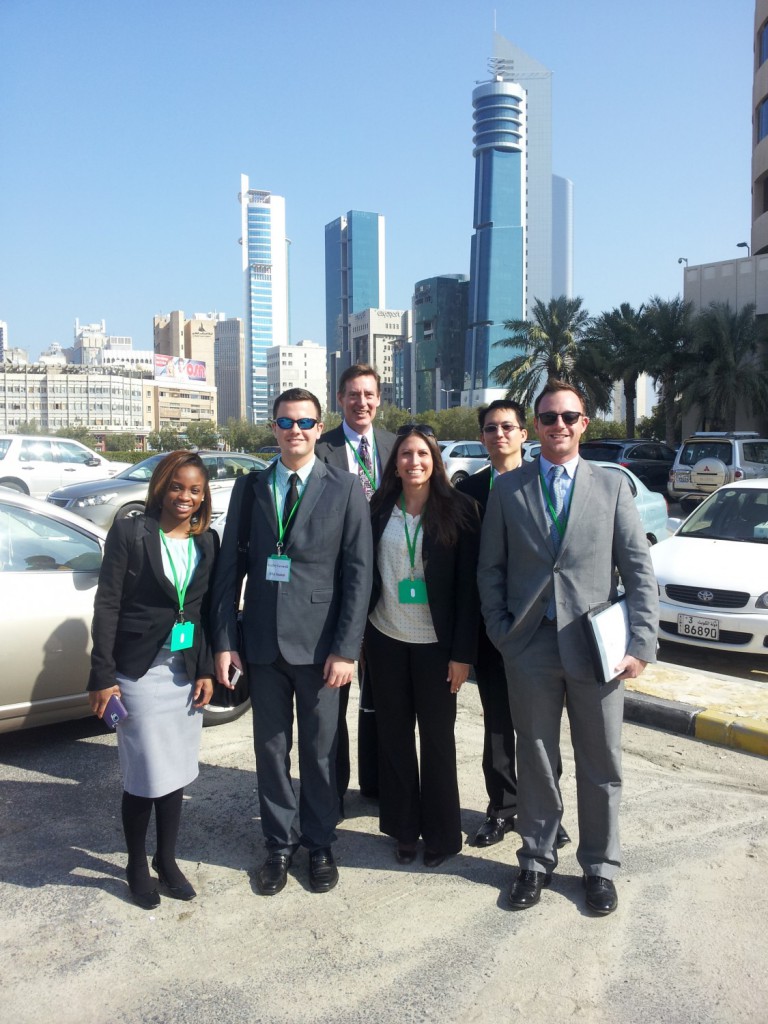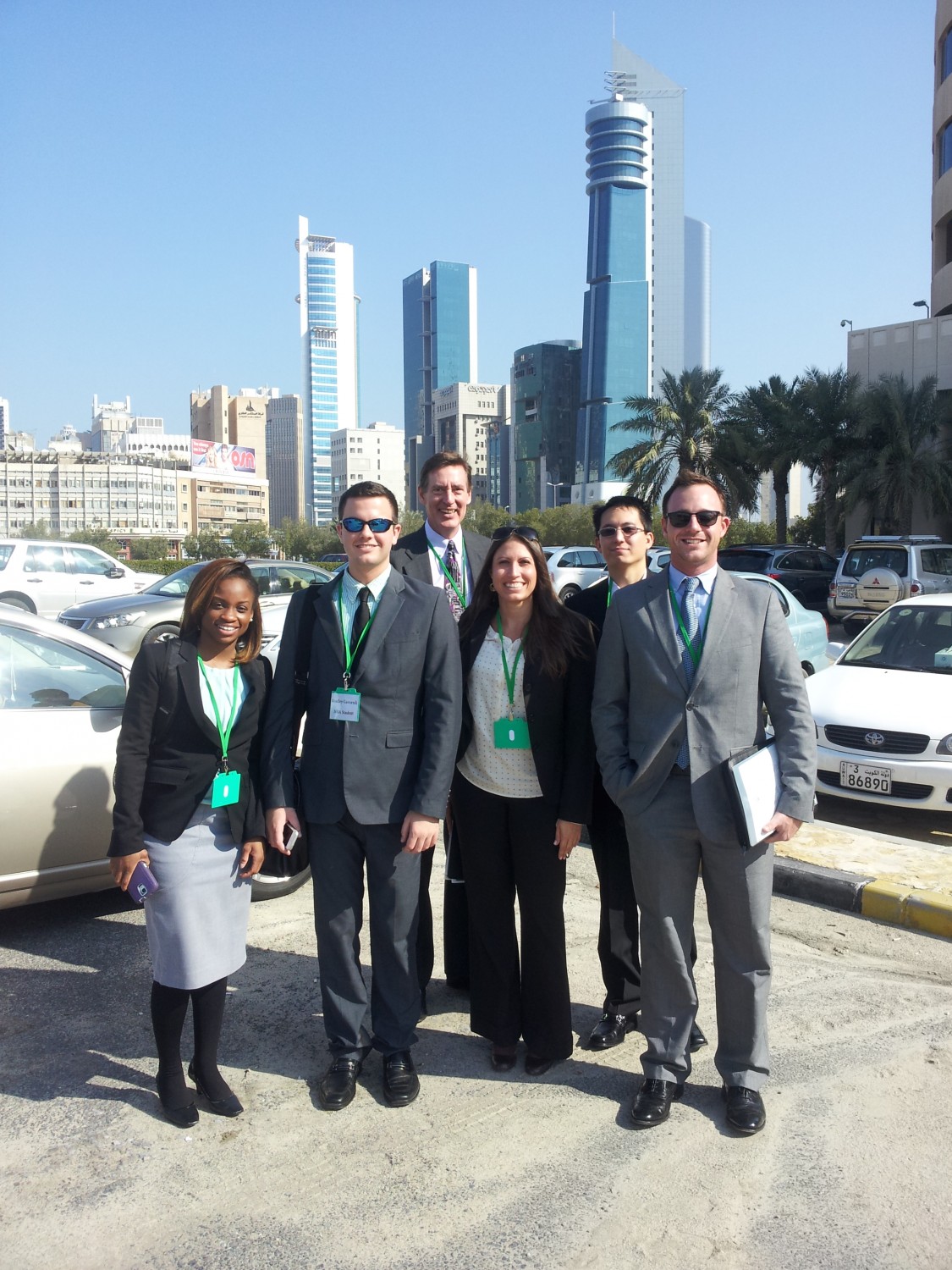
Last month, five USF St. Petersburg MBA students traveled 7,250 miles to expand their knowledge of banking, finance and Islamic culture.
Matt Jackson, Liz Makofske, Eric LaBarre, Jeneca Williams and Bradley Gavornik, all local working professionals, spent a week in Kuwait with Dr. Gary Patterson. The group was hosted by the Kuwait government, which funded the trip entirely.
The opportunity arose while Jackson was interning for World Partnerships, a nonprofit that hosts global leaders in the Tampa Bay area. During his stint with the company, he met Kuwait officials who helped arrange the outing.
The goal of the trip was to learn about Islamic banking and how the Kuwait economy, which is largely sustained on oil, will begin to diversify over the next 50 years or so – when the country’s oil is expected to run out.
While the trip was educational from a business standpoint, it was also an opportunity for the students to immerse themselves in a new culture.
Though initially weary about Kuwait’s location – just 16 miles from the Iran border – the group said they felt completely safe in the Middle Eastern country.
“It was just like going to New York,” Makofske said. The group agreed they felt safer walking the streets of Kuwait at 11 p.m. than they did at home.
The similarities between American and Kuwaiti culture was another surprise.
“They’re more similar to us than they are different,” Jackson explained.
From what they saw, Kuwaiti women are even more obsessed with shopping than Americans are. Makofske and Williams, the only female students on the trip, made an extra effort to dress modestly out of respect for Islamic culture. Sometimes, though, their dress seemed even more conservative than that of Kuwaiti women.
The students did, however, encounter at least one big cultural divergence – dating life. Most Kuwaiti women live with their parents until they marry.
Another shocking difference is the absence of poverty in Kuwait. Everyone gets an education and everyone gets a job. The unemployment rate in Kuwait is only about 2.5 percent. It’s 7.3 percent in the United States.
Patterson explained Kuwait’s wealth system begins at upper middle class and goes up from there. The only people who may be considered poor are foreign workers who usually work service jobs.
There is also no tax in Kuwait and interest cannot be charged on money. Instead, Kuwait banks charge fees, or “payments,” with loans to make a profit.
Nearly all Kuwaiti homes would be considered mansions in the United States. The students compared them to those in St. Petersburg’s Coffee Pot Bayou – except covered in marble. Labarre added that Kuwaitis “are obsessed with smell,” with some homes offering a new aroma in each room.
The group visited Kuwait University, a public Arab university, and the American University of Kuwait, which is modeled after the American system of higher education.
Though Kuwait University wasn’t in session during their visit, walking into the American University of Kuwait was like “walking into USF,” Williams said. “It was completely different from what you would expect.”
And they even served American-sized coffees there, Jackson added.
Kuwait residents attend college for free. The government will even fund education in other countries, which is why many travel to the United States for college. Despite the hemispherical distance, the group managed to find some USF alumni on their trip.
The students found Kuwait’s investment in its youth and small business enterprises reminiscent of St. Petersburg.
The Kuwait government uses a youth program to get a grasp of the younger generation’s thinking to help with policymaking for the future, Makofske explained. It’s a practice she’d like to see Americans pick up on.
“Any time we can get youth more active in any country, it’s going to be a good thing,” she said.
Patterson and the students were treated as VIPs in Kuwait, put up in a fancy hotel, chauffeured through the city and treated to dinners with high-ranking officials. The group chatted with the governor of the Kuwait bank, the president’s economic adviser, the head of Kuwait’s petroleum company and a former prime minister, among others. After returning home, they saw a familiar face being interviewed on CNN, someone they’d met just days before.
One of the most valuable takeaways from the trip was a newfound viewpoint on Middle Eastern countries, Gavornik said. He and his colleagues are eager to share what they learned with their families and peers.
While most student groups hosted by the Kuwait government come and leave as mere visitors, the USFSP group was able to establish a more meaningful relationship with their hosts. Patterson hopes the relationship will continue to develop and is working on maintaining contact.



